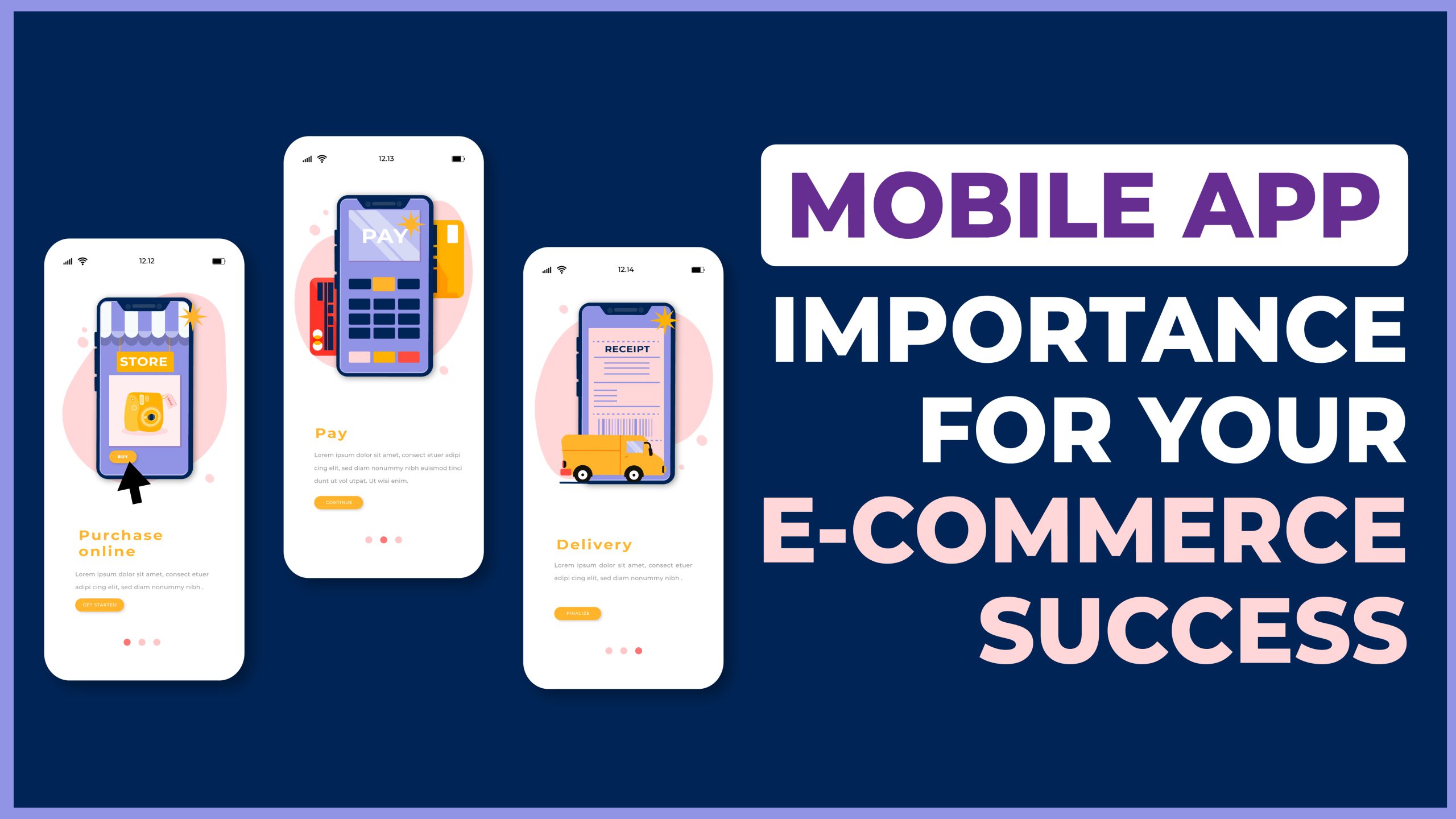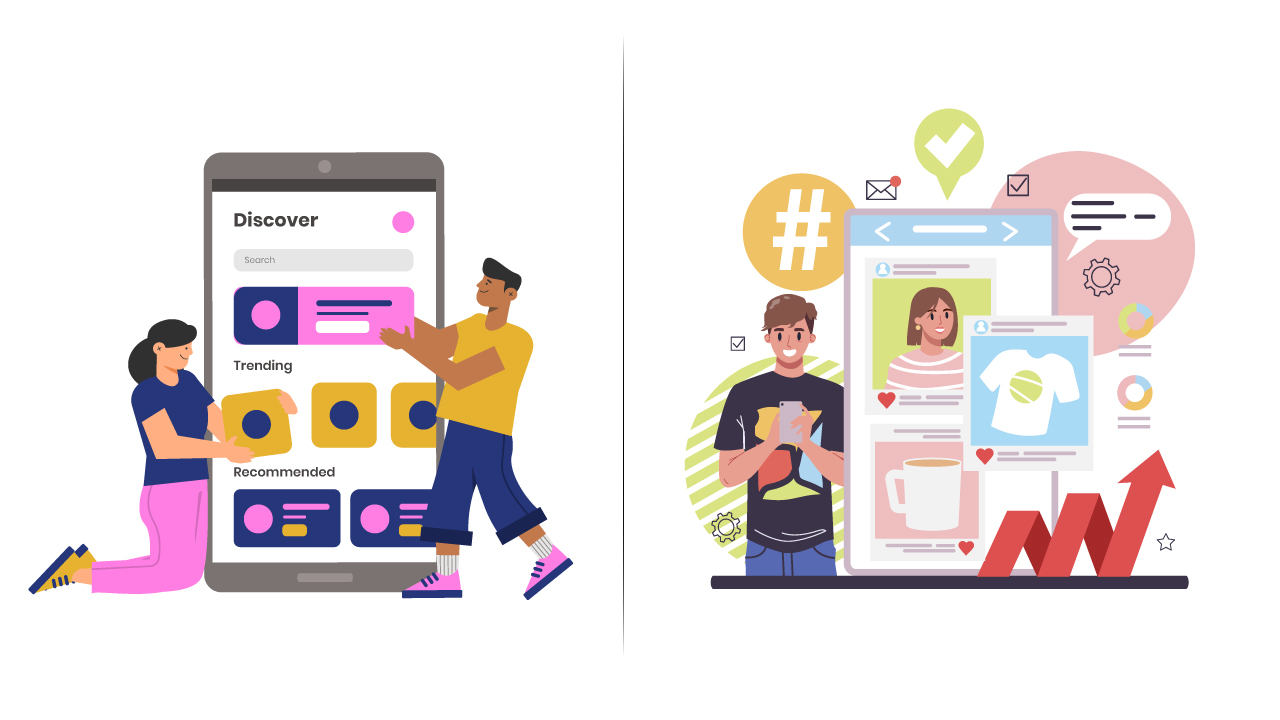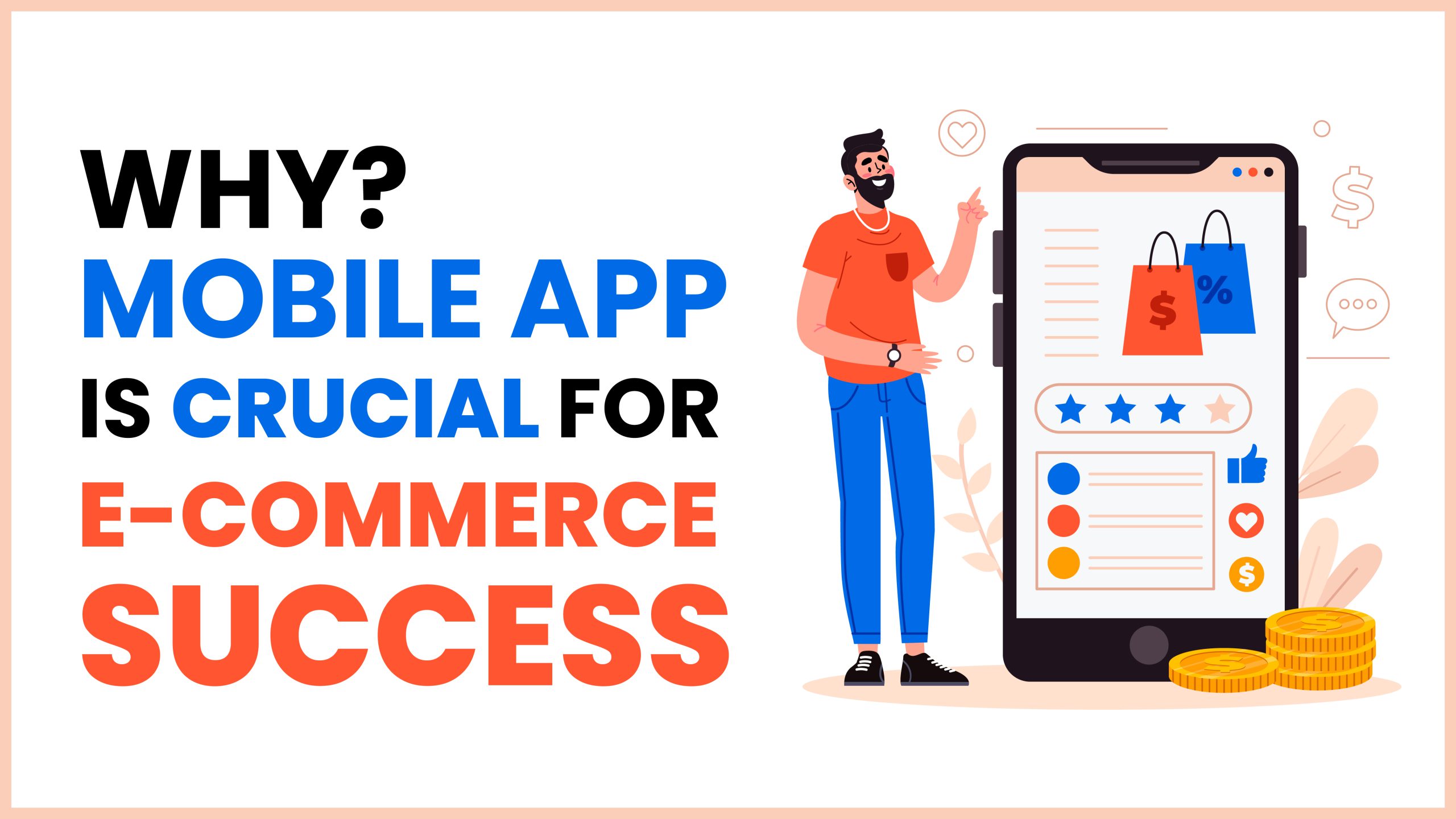
Mobile App Essentials for Successful E-Commerce in 2024: The Complete Guide
In the modern digital age, having a solid online presence is crucial for anyone looking to thrive in the e-commerce sector. One key strategy to boost your e-commerce site’s effectiveness and reach a broader audience is to create an outstanding mobile app.
A mobile application for your online store offers several advantages that can spur growth and success. It lets you provide tailored marketing directly to customers, which increases their engagement and the chances they’ll make a purchase.
Furthermore, due to the widespread use of mobile apps in India, prioritizing mobile app development is a must to outperform your competitors. By investing in the expansion of your business, your e-commerce platform can establish a powerful brand presence and keep customers coming back for more.
This write-up explores why your e-commerce site needs to embrace mobile technology, how it can benefit your enterprise in India through digital marketing and provides you with 15 reasons why embracing e-commerce is critical by the year 2024. Let’s dive in!
Key Points:
- Adopting Mobile applications for e-commerce websites increases user engagement and improves customer satisfaction.
- Mobile applications increase conversion rates by offering features such as instant notifications and payments.
- Mobile apps provide a better user experience because they work better and faster than web-based mobile versions.
- Adopting a mobile-first approach is crucial for e-commerce websites in India, considering the rapid rise in mobile internet usage.
- Mobile apps integrate with your e-commerce website to sync data and customer engagement.
Mobile Application Usage in India

In recent years, mobile applications have grown in India and changed the way people interact with technology. The growth and usage of mobile applications have made them an integral part of the daily life of Indian consumers. As smartphones become more common and Internet penetration continues to increase, mobile applications are becoming an integral part of India’s digital landscape.
The number of smartphone users in India is expected to exceed 859 million by 2024; This points to the great potential in mobile application usage in the country. What makes mobile apps different for Indian consumers is that beyond shopping, entertainment, communication or accessing various services, mobile apps provide convenience, ease of use and many features that meet these needs.
“Mobile apps are changing the way we live, work and socialize in India. From ordering food to getting a ride, everything is just a few taps away.” Various activities include online shopping, business, travel and entertainment. Easy access to these services anytime, anywhere through mobile applications has also changed the way people interact with digital platforms.
Moreover, mobile applications have become an important part of marketing strategies to connect with the target audience. From established e-commerce giants like Flipkart and Amazon to startups, companies are using technology to improve customer experience, increase engagement and increase sales.
For an overview of mobile app usage in India, let’s look at the mobile app growth across different mobile app categories:
Mobile Apps Category Number of Downloads (in millions)
E-commerce – 350millions Downloads, Entertainment – 450millions Downloads, Social Media – 600millions Downloads, Food Delivery – 250millions Downloads, Travel and Booking – 200millions Downloads
This report clearly shows the popularity of various mobile group applications in India. From e-commerce to entertainment and social media, mobile applications dominate the digital landscape, reflecting the preferences and attitudes of Indian consumers.
Considering the growing app usage in India, it has become imperative for businesses to harness this trend and prioritize the development of a mobile app to stay competitive in the market. In the following sections of this article, we will explore the various benefits of having a mobile app for your e-commerce website, including enhanced user engagement, higher conversions, and improved overall performance.
Evolution of Mobile Applications:

Mobile Apps have come a long way since the early days of mobile phones, filled with clunky interfaces and user interface mockups. Modern mobile applications now have beautiful designs, fast performance and advanced features to meet the changing needs of customers. Their popularity can be attributed to several factors:
1. Increasing use of smartphones:
Smartphones have become an important part of our daily lives, allowing us to continue accessing the internet and receiving a lot of information. The popularity of smartphones has created an environment where consumers expect businesses to be accessible at their fingertips.
2. Convenience and accessibility:
Mobile applications provide instant access to e-commerce stores, eliminating the need for users to remember URLs and login information. This ease of access improves the overall user experience.
3. Improved user experience:
With clean design, smooth navigation and personalized features, shopping on mobile apps has become a wonderful and easy experience. These features help increase customer satisfaction and loyalty.
4. Push Notifications:
Applications can interact directly with users through push notifications that include announcements, updates, and alerts. This direct line of communication has proven effective in increasing sales and maintaining customer satisfaction.
5. Offline Functionality:
Some mobile phones allow users to view and even place orders offline, providing a great experience even in areas where there is no Internet. This offline feature makes the app different from traditional websites.
Beyond the Website: Unraveling the Distinct Advantages of Mobile Apps:
 While the e-commerce site is the main source, mobile apps have unique advantages that make them impossible:
While the e-commerce site is the main source, mobile apps have unique advantages that make them impossible:
1. Native Features:
The mobile app leverages smartphone features like GPS, camera, and push notifications to provide a rich and more interactive shopping experience. This integration increases user engagement and satisfaction.
2. Personalization:
The application can track user behavior and preferences to provide recommendations and personalized support. This personal touch greatly helps in customer retention.
3. Offline access:
From your mobile device, you can access certain things, like checking the product catalog or wish list, even if you don’t have an Internet connection. This ensures uninterrupted business continuity.
4. Faster Checkout:
Improve the checkout process with stored payment information, making purchases faster and easier for users. This flexibility is key to driving more conversions.
5. Loyalty Programs:
Mobile apps can be integrated with loyalty programs to provide incentives for repeat purchases and build relationships with customers. These services help in brand loyalty and customer retention.
6. Gather Valuable Data:
Mobile ecommerce applications can provide better insights into customer needs by tracking user behavior and preferences. This information can be used to refine marketing strategies, ultimately leading to more targeted and profitable campaigns.
7. Provide targeted advertising:
By using push notifications and in-app distribution, businesses can deliver personalized services directly to users, increase sales and improve their business.
8. Reduce cart abandonment:
Home apps can record abandoned carts and speed up the checkout process, solving problems caused by e-commerce websites. Reducing cart abandonment rates leads to more conversions.
9. Stand out from the competition:
Delivering the best business experience through a well-designed mobile ecommerce application can differentiate your business from your competitors. It positions your brand as forward-thinking and customer-focused.
10. Prepare your business for the future:
Advancing the future of mobile e-commerce ensures your business stays ahead of the curve. Investing in Action Apps is an investment in your long-term business and business growth.
11. 24/7 Availability:
The mobile app allows customers to browse, shop and track orders on the go. This 24/7 service expands your sales ability to accommodate a diverse customer base.
12. Build strong customer relationships:
Mobile apps can facilitate two-way interaction with customers through push notifications and in-app communications. This personal relationship strengthens the bond between the brand and its target audience.
13. Offer location-based services:
Mobile applications that use GPS features can provide services such as store locations and advertising plans based on the user’s location. This improves the overall customer experience by paving the way for business intimacy.
14. Integration with existing tools:
Integrate with existing e-commerce systems, business automation tools, and payment gateways in a clear and efficient way. This integration helps provide a better user experience.
15. Scalability and Flexibility:
Mobile applications can adapt and grow with your business, enabling new features and additional functionality as needed. This scalability ensures that your application remains relevant and efficient in a dynamic business environment.
Why Your E-commerce Business Needs a Mobile App in 2024: 15 Compelling Reasons:

Now that we’ve explored the unique advantages of mobile apps, let’s delve into 15 compelling reasons why developing a mobile app is not just beneficial but crucial for your e-commerce business in 2024:
1. Reach a wider audience:
By using a large number of mobile users, your business can reach its target customers. Mobile phones have opened new ways to acquire customers and enter the market.
2. Increase brand awareness:
The extension of your app on users’ phones increases brand recognition and awareness. This increased awareness helps create a strong and memorable brand name.
3. Improved customer experience:
Mobile apps offer a convenient, personalized and engaging shopping experience that traditional websites cannot provide. This superior customer experience is the key to customer satisfaction and loyalty.
4. Increase sales and conversions:
Simplified tracking, push notifications, and personalized recommendations work together to increase conversions and increase sales. The convenience offered by applications is directly reflected in the quality of your profits.
5. Build customer trust:
Integration of loyalty programs and custom app-based services can encourage repeat purchases, thus building good relationships with customers. This loyalty helps ensure long-term business.
6. Collect valuable data:
Building apps act as a treasure trove of data, allowing businesses to track user behavior and preferences. This information is useful for developing business strategies, increasing sales, and staying ahead of business trends.
7. Provide targeted advertising:
Through push notifications and in-app messaging, businesses can deliver targeted advertising directly to users. This personal approach increases the effectiveness of marketing campaigns and increases sales and engagement.
8. Reduce abandoned shopping carts:
The ability to save abandoned shopping carts and streamline the checkout process solves problems caused by e-commerce sites. Mobile apps help reduce shopping cart abandonment rates.
9. Stand out from the competition:
Offering a mobile shopping experience can differentiate your business from your competitors. It positions your brand as forward-thinking, tech-savvy and committed to meeting customer needs.
10. Future-proof your business:
Use proactive approaches to keep your business up-to-date and competitive in the rapidly evolving digital environment. Investing in mobile apps is an investment in the future growth and success of e-commerce.
11. 24/7 Access:
24/7 access via mobile allows customers to browse, shop and track orders anytime, anywhere. This change is making a difference in the lives and schedules of today’s consumers.
12. Build a strong customer relationship:
Direct communication through push notifications and in-app communication supports two-way interaction with your customers. These personal relationships go a long way towards creating deeper, more meaningful relationships.
13. Provide location-based services:
Using GPS functionality, the mobile application can provide location-based services such as stores and advertising plans. This not only improves the customer experience, but also opens up new avenues for marketing strategies in this area.
14. Integration with existing tools:
Integration with existing e-commerce systems, marketing automation tools and payment gateways to ensure business is consistent and effective. This integration helps provide a better user experience and overall business performance.
15. Scalability and Flexibility:
Mobile applications are not static sites; They can adapt to your business and grow with you. The flexibility to add new features and functionality ensures your app is always in line with changing customer needs and business trends.
Conclusion

In today’s Indian digital economy, having a mobile phone for your e-commerce website is not a luxury but a necessity. With the increasing popularity and usage of apps in the country, businesses have the opportunity to offer customers a personalized and seamless experience.
Mobile applications can bring higher conversion rates to your e-commerce website by providing features such as push notifications, special offers and effective payment methods. In addition, since the performance and speed of the mobile application is better than the mobile version of the site, a better user experience is provided, thus increasing customer satisfaction.
For e-commerce websites to remain competitive in the Indian market, it is very important to adopt the first step. With mobile internet usage rapidly increasing, companies need to optimize their platforms for mobile devices in order to appeal to the increasing number of mobile users.
In addition, the integration of mobile applications with e-commerce websites allows synchronized information, inventory management and customer integration. The ability to personalize and customize recommendations, offers, and user interactions through mobile apps can increase trust and loyalty, encouraging repeat purchases and positive feedback.
In summary, a mobile web application for your e-commerce business has many advantages in the Indian digital market. It provides enhanced user interaction, greater flexibility, improved performance and competitive advantage. By prioritizing mobile first and leveraging the growing mobile market, businesses can increase their e-commerce presence and achieve long-term success in a vibrant and dynamic market.
Frequently Asked Questions:
Q1: How much does it cost to develop a mobile app?
The cost of developing a mobile app can vary widely depending on factors such as complexity, features, platform (iOS, Android, or both), and the development team’s location. While a basic app might cost a few thousand dollars, more complex apps with advanced features can require a more substantial investment. It’s essential to work with experienced application developers who can provide a detailed estimate based on your specific requirements.
Q2: Why does my e-commerce website need a mobile app?
Having a mobile app for your e-commerce website in India’s digital marketplace is essential for several reasons. It can enhance user engagement, drive higher conversions, improve performance and speed, enable a mobile-first approach, seamless integration with your website, offer personalization and customization, increase brand loyalty and trust, and help capitalize on growing mobile commerce trends.
Q3: What are the key features to consider when developing an e-commerce mobile app?
When developing an e-commerce mobile app, key features to consider include a user-friendly interface, secure payment options, streamlined checkout processes, personalized product recommendations, push notifications, offline functionality, and seamless integration with your existing e-commerce platform. Additionally, incorporating loyalty programs, customer reviews, and social media integration can enhance the overall user experience.
Q4: How can a mobile app contribute to my business’s growth?
A well-designed and user-friendly mobile e-commerce application can contribute to your business’s growth in multiple ways. It helps you reach a wider audience, boosts brand awareness, enhances customer experience, increases sales and conversion rates, builds customer loyalty, and provides valuable data insights. Moreover, a mobile app positions your business as technologically advanced and future-proof, staying ahead of the competition in the rapidly evolving e-commerce landscape.
Q5: What is the importance of mobile app usage in India?
Mobile app usage in India has seen significant growth and has become an integral part of daily life for Indian consumers. With the increasing popularity of smartphones, apps offer convenience, accessibility, and various features that enhance the shopping experience, making them a crucial tool for businesses to reach and engage with a large user base.
Q6: What are the benefits of a mobile app in driving higher conversions?
A mobile app can drive higher conversions for your e-commerce website by offering features such as push notifications, which can remind users about abandoned carts or inform them about limited-time offers. Additionally, a mobile app provides a streamlined and user-friendly checkout process, making it easier for customers to complete their purchases and increasing the likelihood of conversion.
Q7: How can a mobile app enhance user engagement for my e-commerce website?
A mobile e-commerce app can enhance user engagement for your e-commerce website by providing a seamless and personalized shopping experience. It allows for tailored product recommendations, exclusive offers, simplified checkout processes, and customized user interfaces, all of which contribute to increased customer satisfaction and higher levels of engagement.
